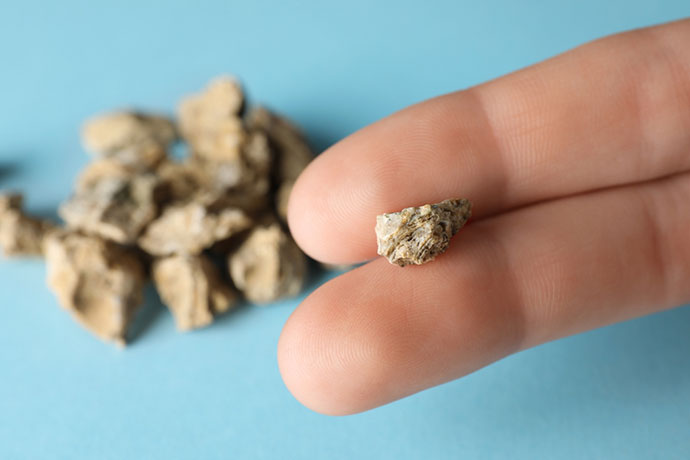What Are Kidney Stones?

Kidney stones, also known as renal calculi, are solid deposits containing minerals and salts that accumulate within the kidneys. They can range from the size of a grain of sand to the size of a golf ball. The formation of these stones occurs due to increased concentrations of substances, such as calcium, oxalate, and uric acid, in the urine. This causes minerals to crystallise and aggregate over time.
What Are the Causes?
The following are some factors that contribute to the development of kidney stones:
- Insufficient Water Intake - When the body is dehydrated, the urine becomes concentrated, which allows minerals and salts to crystallise.
- Diet - Consuming foods rich in oxalate, sodium, and protein can increase the risk of kidney stones formation.
- Obesity - Being obese or having a high body mass index (BMI) is a contributing factor to developing kidney stones.
- Family & Personal History of Kidney Stones - Genetic factors influence how the body processes minerals, making an individual susceptible to kidney stone formation.
What Are the Signs and Symptoms of Kidney Stones?
Small kidney stones usually do not cause symptoms and can be easily expelled through the urine. However, larger stones can block the ureter and disrupt urine flow. When this occurs, the following symptoms may develop:
- Pain in the Lower Abdomen and Groin - The pain comes in waves, fluctuates in intensity, and may also radiate to the upper back or sides of the body.
- Nausea and Vomiting - This may arise from the body’s natural response to pain and discomfort from the stone’s movement through the urinary tract.
- A Change in the Frequency and Volume of Urinating - This can affect the urination pattern, including an increased urge to urinate or the sensation of incomplete emptying.
- Discoloured, Cloudy, and Foul-Smelling Urine - This may cause abnormal urine appearances, such as a change in colour, cloudiness, or having a strong and unpleasant odour.
- Fever - This may arise from an infection in the urinary tract caused by kidney stones.
- Blood in the Urine - Due to damage in the urinary tract, blood in the urine may occur in a pink, red, or brownish hue.
- Difficulty in Passing Urine - Large kidney stones can obstruct the urinary tract, causing difficulty and pain during urination.
If you notice any kidney stone symptoms, schedule a detailed evaluation and personalised treatment plan with our urologist.
Book an Appointment
What Are the Different Types of Kidney Stones?
Common types of kidney stones include:
- Calcium Oxalate - This is the most common type of kidney stone that forms when calcium combines with oxalate, a natural substance present in certain foods.
- Uric Acid - This type of kidney stone develops from food containing high protein levels that produce chemical compounds called purines, which increase urine acidity.
- Struvite - This type of kidney stone expands rapidly due to urinary tract infections (UTIs) and may cause complications such as kidney damage.
- Cystine - This is common to individuals with a genetic disorder called cystinuria; and it causes the kidneys to expel certain amino acids.
How Are Kidney Stones Diagnosed?
There are various diagnostic tests that a kidney stone specialist in Singapore may perform to determine the presence of kidney stones, including:
- Blood testing - This test measures calcium or uric acid levels in the blood that may indicate kidney stone formation.
- Urine testing - This test collects urine samples over 24 hours to measure the level of substances and determine whether the urine is infected and contains blood.
- Image testing - The use of imaging scans, such as an X-ray, ultrasound, or CT scan, helps visualise kidney stones and identify their size and location.
What are Possible Complications of Kidney Stones?
If not treated in time, kidney stones may result in the following complications:
- High fever and chills
- Infections, such as septicaemia or blood poisoning by bacteria
- Kidney damage or renal scarring
- Kidney failure
- Bladder blockage
This is why, if you notice any symptoms of kidney stones, you should seek urgent treatment with a kidney stones specialist in Singapore for prompt diagnosis and treatment.
What Are the Available Treatments for Kidney Stones in Singapore?
Kidney stone treatment in Singapore varies depending on factors such as the size, location, and type of kidney stone present.
For smaller kidney stones, they often pass naturally through the urinary tract without medical intervention. Increasing fluid intake, particularly water, may help flush them out.
However, patients with larger kidney stones experiencing persistent symptoms or complications may require medications or even undergo kidney stone surgery in Singapore. These treatments include:
- Medications - Certain medications may be prescribed to prevent calcium and uric acid stone formation through the control of acid or alkali levels in the urine.
-
Surgical Treatment - Kidney stone surgery may be necessary if conservative measures or medications prove inadequate. These treatments include:
- Extracorporeal Shock Wave Lithotripsy (ESWL) - This is a non-invasive treatment for kidney stones that uses high-frequency shock waves to break the stones into smaller fragments, making them easier to pass through the urinary tract.
- Percutaneous Nephrolithotomy (PCNL) - This procedure is usually performed for larger kidney stones, typically under general anaesthesia. It involves making a small incision in the patient’s back and inserting a specialised scope (nephroscope) to locate and remove the kidney stones.
- Ureteroscopic Stone Removal - This procedure is used to remove kidney stones located in the ureter. In this case, the Singapore kidney stone doctor will insert a small fibre optic instrument through the ureter and bladder to dissolve kidney stones with laser.
For a detailed consultation and effective treatment for kidney stones in Singapore, visit our urology clinics at Mount Elizabeth Medical Centre and Parkway East Medical Centre.
How Can Kidney Stone Formation Be Prevented?
Maintaining healthy kidneys is crucial for overall well-being. These organs filter waste, balance fluids, regulate blood pressure, and produce vital hormones. Poor kidney function can result in severe complications, including high blood pressure, anaemia, weak bones, and kidney failure.
Protect your kidney health and prevent conditions like kidney stones by following these preventative tips:
- Maintain proper exercise to achieve optimal weight
- Limit salt intake
- Consume calcium-rich foods (but not calcium supplements)
- Reduce intake of animal protein
- Limit foods/drinks rich in oxalate, such as black tea, chocolate, spinach, etc.
- Avoid sugary drinks and colas
Kidney Stones FAQs
Is Surgery a Good Option for Kidney Stones?
Kidney stone surgery may be recommended if the stones are large, causing severe pain, obstructing the flow of urine, or causing bleeding or infection.
What Size of Kidney Stones Requires Surgery?
Generally, stones larger than 5mm are less likely to pass on their own and may require surgical intervention.
Can You Walk After Kidney Stone Surgery?
Depending on the type of kidney stone surgery performed, most patients are able to walk shortly after the procedure. However, if the procedure performed is more invasive, there might be more limited mobility immediately following the surgery.
Can Kidney Stones Be Treated Without Surgery?
Kidney stone treatment in Singapore varies depending on the size, type and location of the stone, its symptoms, and the patient's overall health. Most kidney stones in small sizes can be treated without surgery, as they will pass on their own within three to six weeks. Others will require medical intervention.
Do You Need to Go to a Doctor for Kidney Stones?
It's crucial to seek help from a Singapore kidney stone doctor for an accurate diagnosis and prompt treatment if you suspect you have kidney stones; as delaying treatment can result in significant pain and complications.

Our Singapore Kidney Stone Doctor
Dr Damian Png Jin Chye
Senior Consultant, Urologist
MBBS (Singapore), FRCS (Edinburgh), M.Med (Surgery), FAMS (Urology)
Dr Damian Png is a senior consultant urologist in Singapore with over 25 years of experience in the field. He offers a comprehensive range of diagnostic and treatment services for all urological conditions affecting the prostate, kidney, bladder, pelvic floor, and urinary tract. He completed advanced training in reconstructive urology in Germany and the UK, equipping him with the expertise to manage complex cases with precision and care. Dr Png is particularly skilled in minimally invasive procedures such as endourology for kidney and urinary stones.

